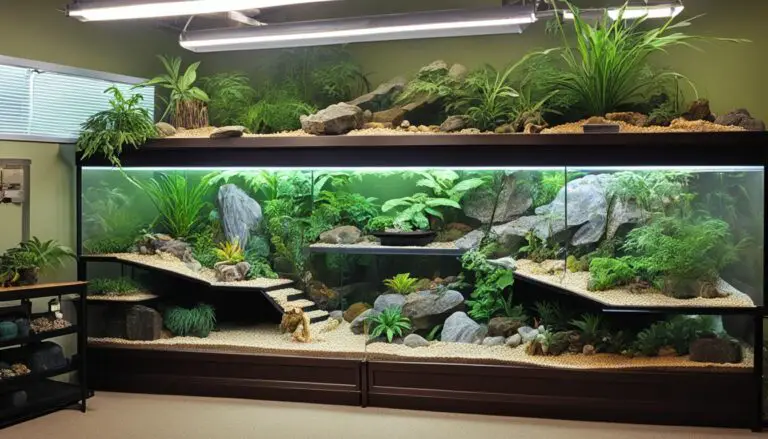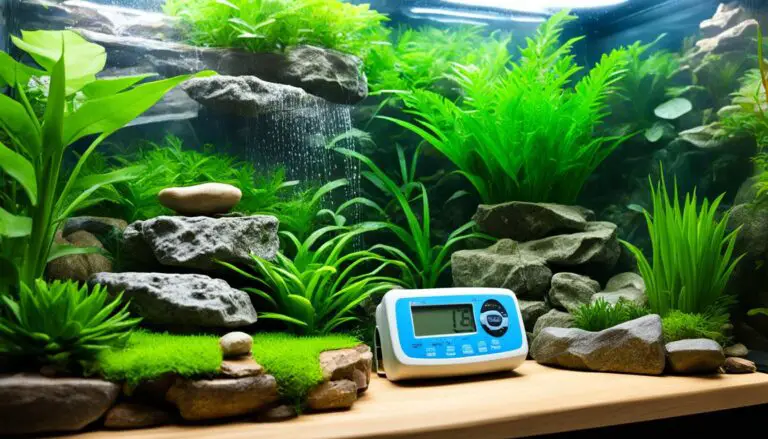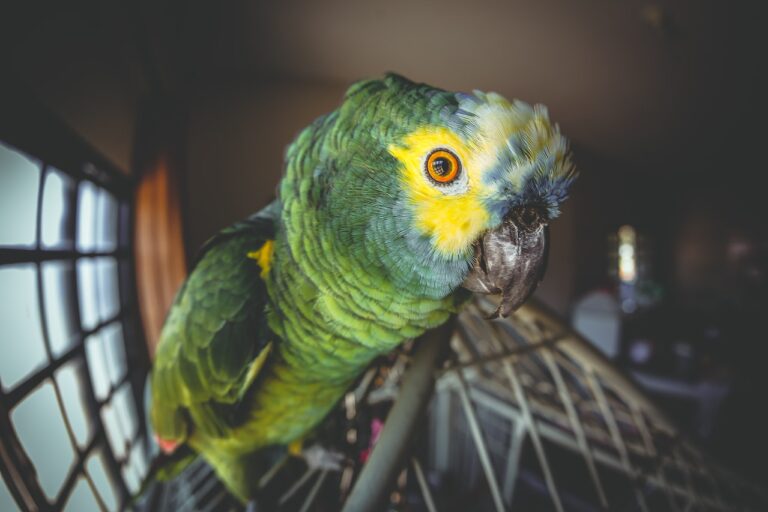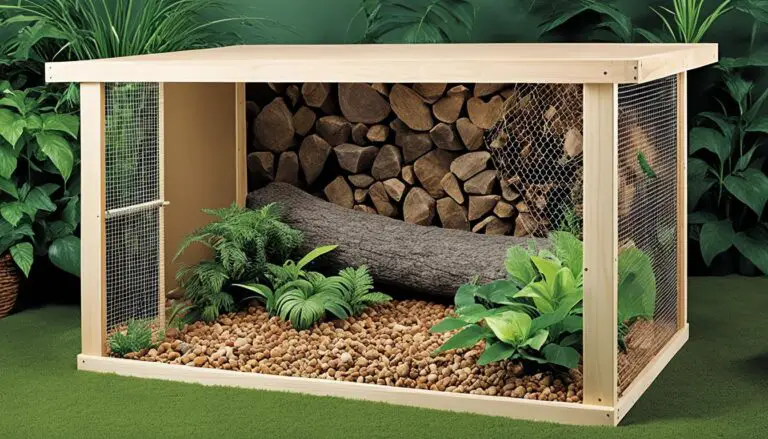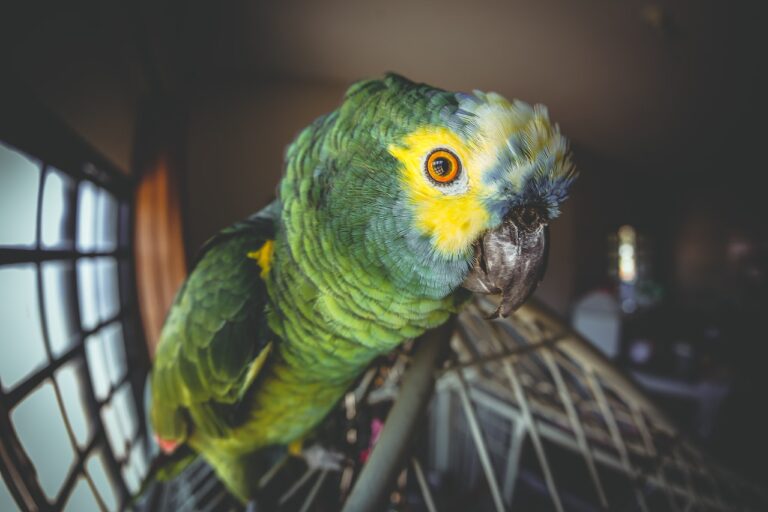Exotic Pet Housing Cleaning Tips & Advice
Owning an exotic pet comes with the responsibility of providing them with a clean and hygienic habitat. Whether you have a bird, reptile, or small mammal, it’s important to follow proper cleaning techniques and best practices to ensure your pet’s health and happiness. In this article, we will provide you with expert tips and advice on how to clean and maintain your exotic pet’s housing.
Key Takeaways:
- Regularly clean and maintain your exotic pet’s housing to ensure their health and happiness.
- Follow proper cleaning techniques and best practices specific to your pet’s species.
- Choose top-quality cleaning products that are safe for your pet.
- Remove and replace soiled bedding in a timely manner to prevent bacterial growth.
- Consult with a veterinarian who specializes in exotic pet care for specific guidance and recommendations.
Getting to Know Your Exotic Pet
Before bringing an exotic pet home, it is crucial to do thorough research and understand its species-specific needs. Each exotic pet has its own set of requirements, including their natural behavior, diet, and potential health risks. By understanding these factors, you can provide optimal care and create a suitable environment for your pet.
Getting to know your exotic pet involves gaining knowledge about its unique characteristics and behaviors. This understanding will help you cater to their specific needs, ensuring they receive the best possible care and quality of life. To assist you in this process, here are some essential aspects to consider when getting to know your exotic pet:
Natural Behavior
Every exotic pet has instinctual behaviors that are specific to their species. These behaviors are developed in response to their natural habitat and the requirements for survival. By observing and understanding your pet’s natural behavior, you can create an environment that allows them to express these behaviors and feel more at home.
Species-Specific Needs
Exotic pets have unique requirements that need to be met to ensure their well-being. For example, certain reptiles may require specific temperature and humidity levels in their enclosure, while birds may need regular opportunities to fly and exercise. Understanding these species-specific needs is crucial to providing the optimal care and environment for your pet.
Dietary Considerations
Feeding your exotic pet a species-appropriate diet is essential for their overall health and longevity. Different exotic pets have varied dietary preferences and nutritional requirements. Some may be herbivores, while others might be insectivores or carnivores. Researching and providing the appropriate diet will help prevent nutritional deficiencies and promote their well-being.
Health Risks
Every exotic pet comes with its own set of potential health risks. Understanding these risks will allow you to identify early signs of illness and seek appropriate veterinary care. Regular veterinary check-ups are crucial for monitoring your pet’s health and addressing any issues before they become serious.
By taking the time to familiarize yourself with these aspects of your exotic pet’s life, you can ensure that they receive the care and attention they need. Remember, each exotic pet is unique, and it is important to tailor their care to their specific needs.

Proper Housing for Exotic Pets
Exotic pets require specialized housing to provide them with a specific environment that mimics their natural habitat. Creating a suitable living space for your pet is essential in ensuring their well-being and preventing stress and health issues.
One of the key factors to consider when designing exotic pet housing is maintaining the appropriate temperature and humidity levels. Different species have different requirements, so it’s crucial to research and understand the specific needs of your pet. For example, reptiles often need a warm and humid environment, while birds may prefer a moderate temperature with controlled humidity.

Light exposure is another crucial aspect to consider when setting up the housing for your exotic pet. Certain species require specific lighting conditions to regulate their circadian rhythm and support their overall health. For example, reptiles often need access to UVB lighting to aid in proper calcium metabolism and prevent skeletal disorders.
Choosing the right substrate type is also important in providing a comfortable and appropriate environment for your exotic pet. Whether it’s a suitable bedding material for a reptile enclosure or a comfortable perch for a bird, the substrate should fulfill the needs of your pet while also being easy to clean and maintain.
“Creating a suitable environment for your exotic pet is crucial in ensuring their well-being and preventing stress and health problems.”
By paying attention to these housing factors, you can provide the best possible living conditions for your exotic pet. Maintaining the proper temperature and humidity levels, providing adequate light exposure, and choosing the right substrate will contribute to their overall health and happiness.
| Housing Considerations | Requirements | Examples |
|---|---|---|
| Temperature | Species-specific temperature range | 75-85°F for reptiles |
| Humidity | Species-specific humidity range | 50-70% for amphibians |
| Lighting | UVB light for reptiles | Repti-Sun 5.0 UVB bulb |
| Substrate | Comfortable and easy to clean | Coconut fiber for reptile bedding |
Essential Dietary Needs of Exotic Pets
Unlike dogs and cats, exotic pets have unique dietary requirements that must be met to ensure their overall health and well-being. Providing a species-appropriate diet is crucial for these animals as it supports their specific nutritional needs, mimics their natural feeding habits, and prevents any potential health issues.
One of the key aspects of an exotic pet’s diet is understanding their specialized dietary requirements. Each species has its own set of dietary needs, and it’s essential to provide a diet that closely aligns with their natural feeding habits. Let’s take a closer look at the dietary needs of some popular exotic pets:
Iguanas:
Iguanas are herbivores and require a diet that consists primarily of fresh vegetables and fruits. Leafy greens like collard greens and dandelion greens should make up a significant portion of their diet. Fruits such as berries and melons can also be offered as treats. Providing a variety of vegetables and fruits ensures that your iguana receives a well-balanced diet.
Parrots:
Parrots have complex dietary needs and require a mix of different foods to thrive. Their diet should include high-quality pellets, fresh fruits, vegetables, and a controlled amount of seeds. Seeds should not be the primary component of their diet as they can be high in fat. Insects, such as mealworms or crickets, can also be offered occasionally as a source of protein.
Ferrets:
Ferrets are strict carnivores, meaning their diet should consist mainly of meat. High-quality commercial ferret foods are available, providing a well-balanced nutritional profile. These foods are specifically formulated to meet the nutritional needs of ferrets and should be the foundation of their diet. Occasionally, small amounts of raw or cooked meats, such as chicken or turkey, can be offered as treats.
It is important to note that feeding an exotic pet requires careful consideration of their individual dietary requirements. Consult with a veterinarian who specializes in exotic pet care to develop a proper feeding plan tailored to your pet’s specific needs. They can provide guidance on portion sizes, frequency of feeding, and supplementary food options.
In addition to providing a species-appropriate diet, it is crucial to ensure that the food offered is fresh, clean, and free from any contaminants. Regularly inspect and remove any uneaten food to prevent spoilage or bacterial growth.
Remember, each exotic pet is unique, and their dietary needs may vary. Stay informed about the specific dietary requirements of your pet’s species, and consult a veterinarian for advice and recommendations.

| Exotic Pet | Specialized Diet |
|---|---|
| Iguanas | Fresh vegetables and fruits |
| Parrots | Pellets, fruits, vegetables, occasional seeds and insects |
| Ferrets | Quality commercial ferret food, occasional raw or cooked meats |
The Value of Regular Vet Check-ups for Exotic Pets
Regular vet check-ups are essential for maintaining your exotic pet’s health. These check-ups allow for early detection of potential health issues and provide an opportunity to discuss diet, housing, or behavior concerns with your vet. Preventative health care, including vaccinations and parasite treatments, can also be part of these regular check-ups.
Exotic pets, just like any other animals, are susceptible to various health conditions. However, due to their unique nature, they may require specialized care and attention. Regular vet check-ups can help ensure that your exotic pet receives the necessary medical care, preventing and treating any potential health problems.
Veterinarians who specialize in exotic pet care have the expertise and knowledge to assess and address the specific needs of different exotic species. They can provide guidance on proper nutrition, housing, and overall well-being, tailored to your pet’s individual requirements.
During these check-ups, your vet will conduct a thorough examination, checking for any signs of illness or abnormalities. They may also recommend additional diagnostic tests, such as blood work or imaging, to evaluate your pet’s health from the inside out.

Preventative Health Care
Preventative health care is a crucial aspect of regular vet check-ups for exotic pets. Your vet will ensure that your pet is up-to-date on vaccinations, protecting them against common diseases.
Additionally, your vet may provide parasite treatment to prevent infestations and protect your pet from harmful parasites like fleas, ticks, mites, and worms. These treatments are essential for your pet’s overall well-being and can help prevent the spread of diseases.
Early Detection and Intervention
Regular vet check-ups enable early detection and intervention for any potential health issues your exotic pet may face. Many conditions, when caught early, are easier and less costly to treat. By identifying health problems in their early stages, your vet can develop a treatment plan to address the issue promptly.
Regular vet check-ups are essential for maintaining your exotic pet’s health. These check-ups allow for early detection of potential health issues and provide an opportunity to discuss diet, housing, or behavior concerns with your vet.
Moreover, routine check-ups also provide an opportunity for you to discuss any concerns or questions you may have about your pet’s well-being. Your vet can offer valuable guidance on providing optimal care, including diet adjustments, environmental enrichment, and behavioral training.
Regular vet check-ups are an investment in your exotic pet’s health and happiness. By prioritizing preventative health care and maintaining a strong relationship with your vet, you can ensure that your pet enjoys a long, fulfilling life.
Safely Handling Your Exotic Pet
Handling exotic pets requires special care and attention. Unlike traditional pets, their unique physiology and behavior demand gentle handling techniques. By taking the time to build trust and ensuring the safety of both you and your pet, you can create a positive and enriching experience.
Importance of Gentle Handling
Gentle handling is crucial when it comes to exotic pets. Mishandling can lead to stress, injury, or even significant harm to your pet’s physical and mental well-being. Adopting gentle handling techniques will help minimize stress and create a strong bond of trust between you and your exotic pet.
When handling your exotic pet, consider the following tips:
- Approach your pet calmly and confidently, ensuring a relaxed environment.
- Use gentle movements and avoid sudden gestures or loud noises that may startle your pet.
- Support your pet’s entire body when lifting them, especially if they are small or delicate.
- Take cues from your pet’s body language and adjust your handling accordingly. If they seem uncomfortable or agitated, give them space and try again later.
- Handle your pet regularly to help them become accustomed to human interaction.
Supervise Children Around Exotic Pets
When it comes to children and exotic pets, supervision is vital. Children may not understand the proper handling techniques or recognize the signs of an agitated or stressed pet. Educating children about the gentle handling of exotic pets is essential to prevent accidents or harm.
Here are some guidelines for supervising children around exotic pets:
“Always ensure that children are under adult supervision when interacting with exotic pets. Teach them to approach the animal calmly and avoid any sudden movements. Emphasize the importance of being gentle and respectful towards the pet, as well as understanding the boundaries set by the animal’s species-specific needs.”
Building Trust with Your Exotic Pet
Building trust is a crucial aspect of handling exotic pets. By establishing trust, your pet will feel more comfortable in your presence, making handling and interaction easier and less stressful for both of you.
Here are some ways to build trust with your exotic pet:
- Start by spending time near your pet’s habitat, allowing them to observe you and become familiar with your presence.
- Use positive reinforcement, such as treats or verbal praise, to reward your pet for calm behavior during handling sessions.
- Gradually increase the duration and intensity of handling sessions as your pet becomes more comfortable.
- Be patient and understanding, allowing your pet to set their own pace.
| Gentle Handling Techniques | Supervising Children | Building Trust |
|---|---|---|
| Approach calmly and confidently | Always under adult supervision | Start with observing |
| Use gentle movements | Teach gentle handling | Use positive reinforcement |
| Support the entire body | Avoid sudden movements | Gradually increase handling sessions |
| Take cues from body language | Emphasize respect and boundaries | Be patient and understanding |
| Handle regularly | Prevent accidents or harm |
Providing Mental Stimulation for Exotic Pets
Exotic pets, just like any other pet, need mental stimulation to stay happy and prevent behavioral issues. Environmental enrichment plays a vital role in keeping their minds active and engaged. By providing a variety of toys, puzzles, and foraging opportunities, you can create a stimulating environment for your exotic pet.
One great way to stimulate a bird’s mind is through the use of puzzle feeders. These toys require the bird to work for its food, encouraging problem-solving skills and keeping them mentally sharp. For reptiles, hiding food and creating hunting opportunities can help replicate their natural behavior, providing both physical and mental stimulation.
When selecting toys for your exotic pet, consider their natural behaviors and instincts. For example, birds enjoy toys they can chew or manipulate, such as ropes, bells, or puzzle toys. Reptiles may benefit from interactive toys that encourage exploration or provide hiding spots.
In addition to toys, environmental enrichment can also involve creating foraging opportunities. This can be done by scattering food or treats around their enclosure, encouraging them to search and find their meals, just as they would in the wild.
Expert Tip
Rotate the toys and puzzles you provide to keep your exotic pet engaged. Introduce new ones regularly and remove old ones to prevent boredom.
Creating a mentally stimulating environment for your exotic pet is essential for their overall well-being and happiness. By providing them with toys, puzzles, and foraging opportunities, you are giving them an outlet for their natural behaviors and instincts. Remember, a mentally stimulated pet is a happy pet!
Maintaining Hygiene for Exotic Pets
Cleanliness is crucial when it comes to preventing illnesses in exotic pets. Regular cleaning of habitats and removal of soiled bedding are essential tasks for maintaining a hygienic environment. However, cleanliness goes beyond just the living space. It’s equally important to clean your pet’s toys, feeding bowls, and water dishes regularly to prevent bacterial growth and ensure their overall well-being.
Regular cleaning of your exotic pet’s habitat is necessary to prevent the buildup of dirt, bacteria, and unwanted pests. Depending on the specific needs of your pet, you may need to clean their habitat on a daily, weekly, or monthly basis. Establishing a cleaning routine will help you maintain cleanliness consistently and avoid any potential health hazards.
When cleaning your pet’s habitat, use pet-safe cleaning products or a solution of mild soap and water. Avoid using harsh chemicals or strong disinfectants that may be harmful to your pet’s health. Thoroughly rinse and dry the habitat before placing your pet back in its clean environment.
Soiled bedding should be removed promptly to prevent odor, bacterial growth, and potential respiratory issues for your exotic pet. Bedding material depends on the type of pet you have, and it’s important to select an appropriate bedding material that is safe, absorbent, and easy to clean. Follow the manufacturer’s instructions when washing bedding to ensure proper cleanliness and preservation of material quality.
“Cleanliness is crucial when it comes to preventing illnesses in exotic pets.”
Cleaning Tips for Toys, Dishes, and Utensils
In addition to habitat cleaning, it’s essential to clean your exotic pet’s toys, dishes, and utensils regularly. These items can accumulate bacteria, food particles, and saliva, which may lead to infections or gastrointestinal issues if not properly cleaned.
To clean toys, you can use mild dish soap and warm water. Scrub the toys thoroughly, ensuring all debris is removed, and rinse them well. Allow the toys to air dry or use a clean towel before returning them to your pet’s habitat.
Feeding bowls and water dishes should be cleaned after every meal or at least on a daily basis. Use hot water and mild dish soap to clean these items, ensuring all residue is removed. Rinse them thoroughly to avoid any soap residue, as this can be harmful if ingested by your pet. Air dry the dishes completely or use a clean, dry cloth before adding fresh food or water.
“Regular cleaning of habitats and removal of soiled bedding are essential tasks for maintaining a hygienic environment.”
Regular cleaning of your exotic pet’s habitat, along with cleaning toys, dishes, and utensils, is necessary to promote a clean and hygienic environment for your beloved companion. By maintaining cleanliness, you can help prevent the spread of diseases and ensure the overall well-being of your exotic pet.
Social Interaction for Exotic Pets
Exotic pets, such as parrots or ferrets, are naturally social creatures that thrive on social interaction with their owners. By spending quality time with your pet, providing companionship, and engaging in play, you can significantly enrich their lives and strengthen your bond. Regular social interaction is essential for the overall well-being and happiness of your exotic pet.
Handling your pet frequently: Proper handling plays a crucial role in promoting socialization. Gently handling your pet on a regular basis not only helps them become accustomed to human interaction but also reinforces trust and strengthens your relationship. However, it is important to be mindful of your pet’s comfort and boundaries while handling them.
Companionship: Some exotic pets require companions of the same species to satisfy their social needs. For example, certain bird species may become lonely without the companionship of fellow birds. It is important to research the specific social requirements of your pet and consider providing them with suitable companions, if necessary. However, always introduce new companions gradually and monitor their interactions to ensure compatibility and avoid potential conflicts.
Remember, social interaction provides mental stimulation and prevents boredom in exotic pets, promoting their overall well-being and happiness. Take the time to engage with your pet and provide them with the companionship they need to lead a fulfilling life.
| Benefits of Social Interaction for Exotic Pets | How to Promote Social Interaction |
|---|---|
|
|
Conclusion
Proper care and maintenance are essential for the overall well-being of your exotic pet. By implementing the tips and advice shared in this article, you can ensure that your pet lives a happy and healthy life. However, it’s crucial to remember that regular veterinary care is equally important. Consulting with a veterinarian who specializes in exotic pet care will provide you with personalized guidance and recommendations.
By following a regular cleaning regimen, providing a suitable habitat, and feeding a species-appropriate diet, you can create a clean and hygienic environment for your exotic pet. This will help prevent illnesses and keep your pet happy and content.
Additionally, engaging in social interaction and mental stimulation is vital for the well-being of your exotic pet. Spending quality time with your pet, providing companionship, and ensuring they have opportunities for mental and physical exercise will contribute to their overall happiness.
Remember, being a responsible exotic pet owner entails providing the best care possible. By following these guidelines and consulting with a qualified veterinarian, you can ensure that your exotic pet thrives and enjoys a long, healthy, and fulfilling life.
FAQ
How often should I clean my exotic pet’s habitat?
What should I use to clean my exotic pet’s habitat?
How do I clean my reptile’s cage?
How often should I clean my bird’s cage?
Source Links
- https://www.vetstreet.com/our-pet-experts/spring-cleaning-tips-for-exotic-pets
- https://www.happyhealthypets.com/pet-resources/comprehensive-guide-to-caring-for-exotic-pets
- https://animalfamilyveterinarycare.com/blog/exotic-pet-care-davenport/
Peter Stones is the founder of Exotic Pets Place, the leading online resource for exotic pet care information.
With over 10 years of hands-on exotic pet ownership experience, he is deeply passionate about sharing his expertise to help others properly care for their unusual pets.
When he's not writing extensively researched articles or connecting with fellow exotic pet enthusiasts worldwide, you can find Peter at home tending to his own beloved menagerie of exotic animals.

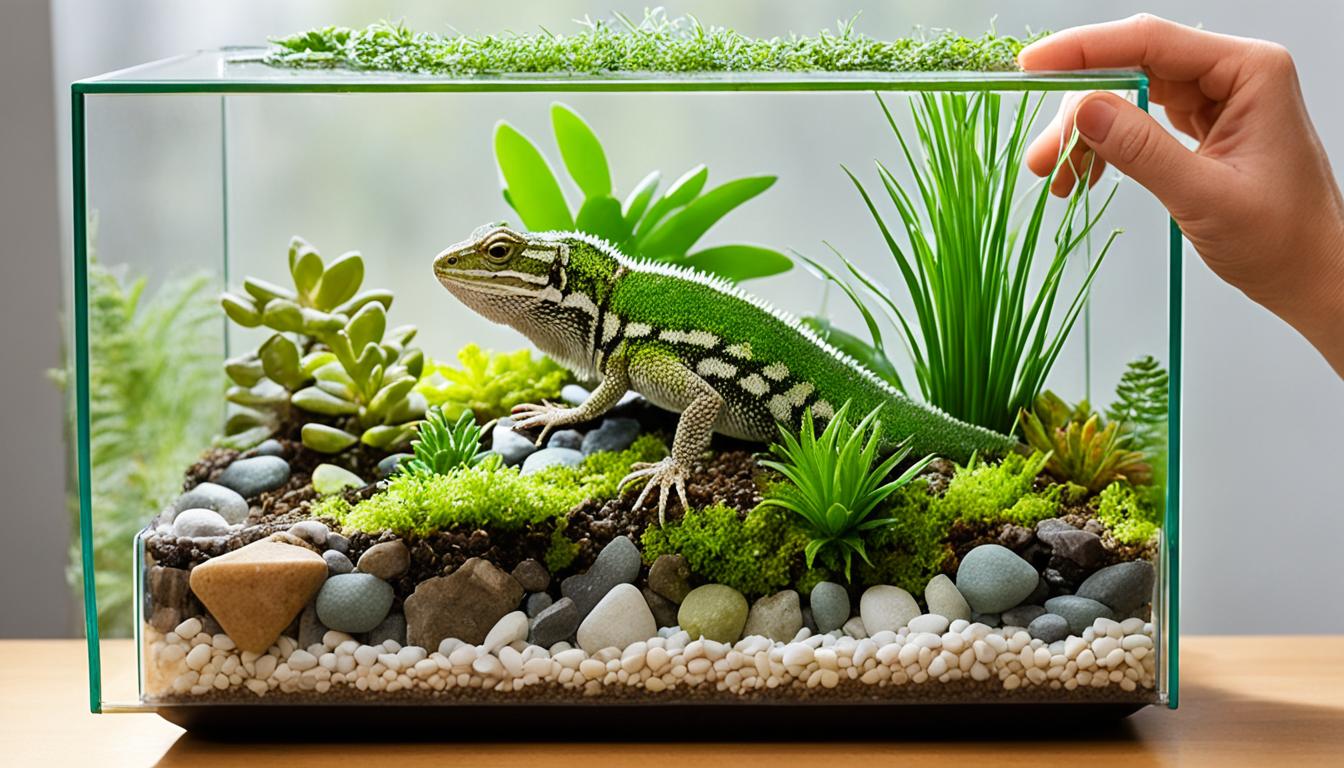
![How to Create a Safe Outdoor Space for Your Exotic Pet [Guide], wood house with a porch](https://exoticpetsplace.com/wp-content/uploads/2023/06/How-to-Create-a-Safe-Outdoor-Space-for-Your-Exotic-Pet-Guide-wood-house-with-a-porch-768x512.jpg)
